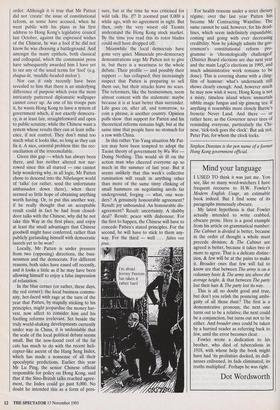Mind your language
I USED TO think it was just me. You see, like so many word-watchers I have frequent recourse to H.W. Fowler's Modern English Usage, an estimable book indeed. But I find some of its paragraphs immensely obscure.
My latest hypothesis is that Fowler actually intended to write crabbed, obscure prose. Here is a good example from his article on grammatical number: The Cabinet is divided is better, because in the order of thought a whole must precede division; & The Cabinet are agreed is better, because it takes two or more to agree. That is a delicate distinc- tion, & few will be at the pains to make it. Broader ones that few will fail to know are that between The army is on a voluntary basis & The army are above the average height, & that between The party lost their hats & The party lost its way.
This is all no doubt good and true, but don't you relish the pouncing ambi- guity of all those thats? The first is a demonstrative pronoun; the next one turns out to be a relative; the next could be a conjunction, but turns out not to be either. And broader ones could be taken by a hurried reader as referring back to few, until the error becomes clear.
Fowler wrote a dedication to his brother, who died of tuberculosis in 1918, with whose help the book might have had 'its prolixities docked, its dull- nesses enlivened, its fads eliminated, its truths multiplied'. Perhaps he was right.
Dot Wordsworth


























































 Previous page
Previous page